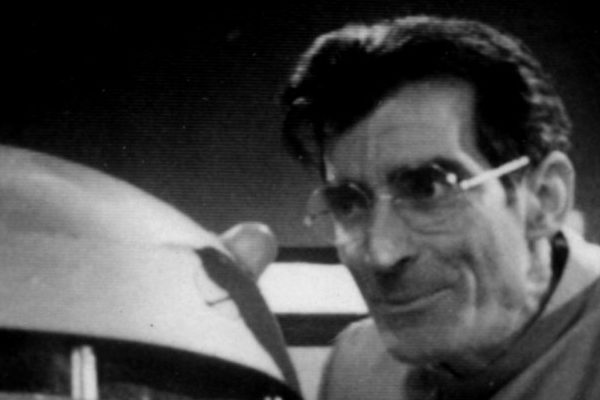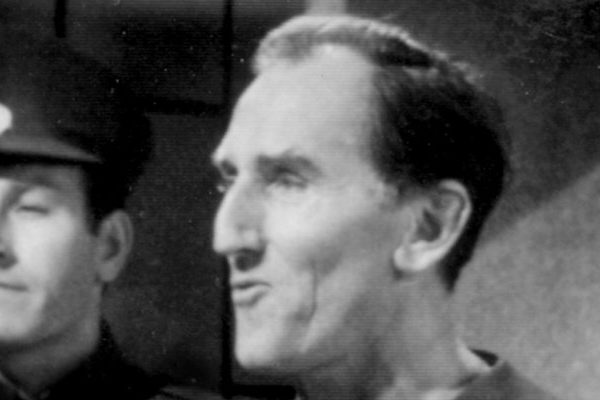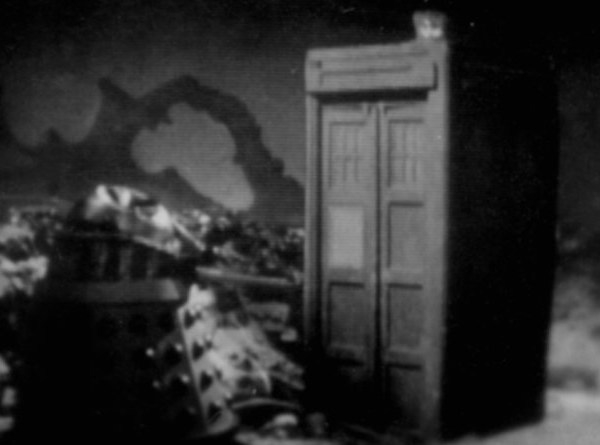|
| ||
|
PRODUCTION CODE EE
WRITTEN BY DAVID WHITAKER
DIRECTED BY CHRISTOPHER BARRY
RATINGS 7.8 MILLION
WORKING
TITLE
RECOMMENDED PURCHASE 'THE POWER OF THE DALEKS' MP3-CD (ISBN 1-563-50417-X) RELEASED IN JUNE 2005.
BLURB Before the astonished eyes of his companions Ben and Polly, the Doctor's whole body has apparently been transformed. Now they are confronted by a stranger who claims to be their old friend, but how can they know whether to trust him?
The TARDIS's arrival on the swamp planet of Vulcan brings its own problems; the Doctor is mistaken for an official come to solve the Earth colony's in-fighting, and soon he and his companions are embroiled in political wranglings. However, a far more serious threat lurks within the colony: The scientist Lesterson has discovered a crashed space capsule, within it a group of inert metallic creatures which the Doctor identifies as Daleks. Refusing to heed the Doctor's warnings, Lesterson supplies power to the Daleks and revives them. The awakened Daleks claim to be faithful servants of humanity, but could such a thing ever be possible? By covert means they seek an increasing level of energy, but for what? By the time the Doctor and his friends discover the Daleks' true plan for the colony, it looks as if it might already be too late to stop them...
BBC ARCHIVE ALL SIX EPISODES ARE MISSING. |
| |
|
|
|
|
|
The Power of the Daleks 5TH NOVEMBER 1966 - 10TH DECEMBER 1966 (6 EPISODES)
Of all the lost Doctor Who serials, The Power of the Daleks is the one that I’m most familiar with. After reading John Peel’s thrilling novelisation of it, I went straight out and bought the BBC Radio Collection soundtrack which I was almost as pleased with – for some reason, no matter which way around I tackle things (book then movie / movie then book / novelisation then original television soundtrack...) I’m always fonder of whichever version I read / saw / listened to first, and this was certainly the case with The Power of the Daleks - until I decided to fork out yet another £13.99 for the MP3-CD release, that is.
I deliberated for a long while before making this purchase - I really wanted to see an official reconstruction of the story, but didn’t like the idea of an MP3-CD. Who wants a CD that they can only watch on their computer? Why not release it on DVD? After all, they’re charging DVD prices for it. And when the MP3-CD arrived, at first I regretted my decision. To even get the damned thing to work, I had to lower my web browser security settings and turn off my pop-up blocker – something that I’m not really comfortable doing. When I finally managed to bring up the episode selection menu, I was horrified to find that there was no ‘Play All’ feature, which meant that every twenty-something minutes I had to haul my lazy arse up and manually launch the next episode. Worse still, when the first episode did actually begin, I was disappointed to find that everything had been, for want of a better word, telesnapped – even the main titles are presented as a series of telesnaps. As for the existing clips – nada. “Soundtrack with pictures” is what it says on the box and “Soundtrack with pictures” is exactly what you get; nothing more. In an online interview BBC Audio’s Michael Stevens claimed that the inclusion of the surviving clips would have been “too jarring” because “your brain gets into a particular frame of processing, and if you suddenly switch to five seconds of moving footage it’s actually more distracting than beneficial.” Loose Cannon reconstructions would certainly disagree with him on that point, and me too for that matter.
Yet I must begrudgingly concede that this particular reconstruction has one enormous pro which outweighs all of its cons and, in fact, sets it up above any of the unofficial reconstructions that have been mounted – the narration of Anneke Wills. Her linking narration fits in beautifully with the telesnaps to give the viewer a fully-rounded picture of what’s going on – at times it’s easy to forget that you’re watching a reconstruction and not the real thing. As a fan, this annoys the hell out of me because on the one hand, we have Loose Cannon who painstakingly reconstruct the lost episodes using everything available to them, but must make do with scrolling text rather than narration; and on the other, we have the Beeb who have the power and resources to make the most brilliant, flawless reconstructions utilising everything available to them on DVD, but instead they are happy to milk us just that little bit more for an MP3-CD before undoubtedly, one day, releasing such a DVD (a DVD that will probably omit optional subtitles, optional narration and optional integrated clips just to rile the few who actually do find moving images too jarring). And speaking of power, despite my cynical observations on the BBC’s marketing of Doctor Who and my technical complaints about the MP3-CD, there is actually a glowing review of a classic story bursting to get out here: a story all about life, change, renewal and - that word again - power.
Above: The Krotons' DVD looks at an era bookended by “show-changing concepts”
Spearhead from Space, Robot, Castrovalva, The Twin Dilemma, Time and the Rani, the TV Movie; even Rose – none of these regeneration stories are a patch on Patrick Troughton’s baptism of fire. The ingenious idea of “renewing” the Doctor turned a successful television show nearing the end of its natural life into the longest-running science fiction series of all time. I’m not sure how well-publicised Hartnell’s departure was prior to the broadcast of this serial, but I know that there were viewers watching the first episode of The Power of the Daleks believing that the real Doctor was off somewhere else, and that the strange cosmic hobo in his place was some sort of outrageous villain. From the dialogue it’s easy to infer, as Ben does, that this man isn’t the Doctor. He says thinks like “The Doctor was quite a collector, wasn’t he?” implying that he’s a completely different person - and in a sense, he is.
What I think makes this serial such a classic though isn’t the “renewal”, or even the Daleks. Though the Daleks are at their zenith here, clearly benefiting from the fresh perspective offered by a writer other than Terry Nation, they are simply the coiled threat ready to spring forth and destroy the colony – it is from the alluring, ambivalent human antagonists that the real drama is borne. Firstly we have Lesterson, a scientist who has discovered a Dalek capsule and wants to reanimate the Daleks for his own selfish reasons. He wants to be the man to solve all of the colony’s problems by providing cheap labour; he wants to have Daleks laying power cables and serving drinks from trays; he wants recognition. Then we have Bragen, the man in charge of security with ideas far above his station. He wants to use the Daleks as weapons to overthrow the Governor and then wipe out the very insurrectionists that support him, giving him complete and utter control over the colony. He wants power.
“I am your ser-vant.”
When Bragen uses a Dalek to exterminate the Governor, the Dalek asks him, almost with disdain, “Why do human beings kill human beings?” It’s quite a profound question, and one that illustrates quite expertly the difference between the humans and the Daleks in this story. Daleks are genetically engineered to kill; they can’t aspire to be anything more than they are – “Daleks conquer and destroy!” is the Dalek army’s battle cry at the end of the fifth episode, and it sums up everything that they can ever be. Bragen and Lesterson, on the other hand, have the potential to be so much better. Naturally, both get their comeuppance: for Bragen, it is death at the hands of the Daleks he tried to manipulate for his own ends; for Lesterson, it’s being on the receiving end of Whitaker’s sweet poetic justice as he realises that the Daleks are planning to annihilate the colony, but no-one will believe him. The character’s descent into madness is hauntingly portrayed by Robert James, who somehow manages to win a little audience sympathy for Lesterson as he meets his startlingly redeeming end.
And then we come to the Doctor. Whilst Patrick Troughton’s pip-hatted performance bares little semblance to those that we’d see later on in his tenure, the qualities that make him such a popular Doctor are still here for all to see - the impish charm, the mischievous grin, the carefully considered incompetent façade. In Lesterson he has a great foil - a scientist who is every bit as pig-headed as he is; a man he can’t beat into submission with his arguments. It’s up against the Daleks, however, where Troughton is at his best. The former Robin Hood does a magnificent job of conveying not only the Doctor’s fear, but also his uncertainty. His brain has been through the meat grinder, and although he knows that the Daleks are evil and must be destroyed, there are certain memories he can’t quite place… It truly is a wonderful performance.
The ending of the story is aberrantly dark, but lifted by what’s probably best described as a ‘nursery rhyme’ feel. The final episode flashes past in a tumult of sound and fury, leaving every Dalek; every human baddie; even every shade of grey dead. The Power of the Daleks is a cautionary tale for those who will not listen; for those who hunger for power and glory. Troughton’s first Doctor Who story is one of – if not the – very best of is reign and, if you want to enjoy the serial as fully as possible, then I have to reluctantly recommend the BBC’s money-spinning MP3-CD. It may not be the ideal way to enjoy this historic serial, but regrettably it’s the best there is.
For now.
|
||
|
Copyright © E.G. Wolverson 2006
E.G. Wolverson has asserted his right under the Copyright, Design and Patents Act 1988, to be identified as the author of this work. |
||
|
Unless otherwise stated, all images on this site are copyrighted to the BBC and are used solely for promotional purposes. ‘Doctor Who’ is copyright © by the BBC. No copyright infringement is intended. |
||

.jpg)
.jpg)
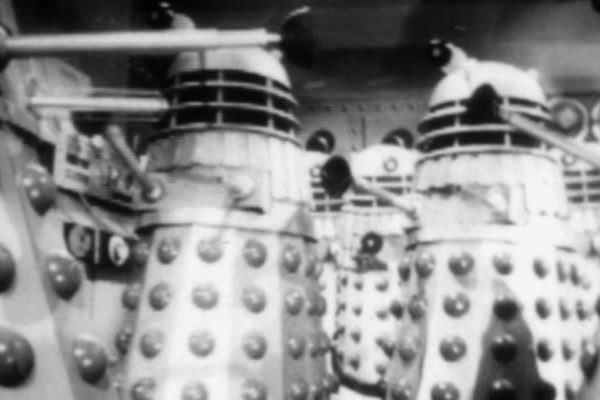
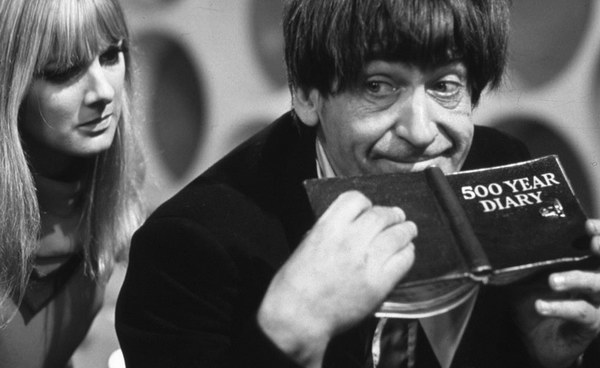
.jpg)
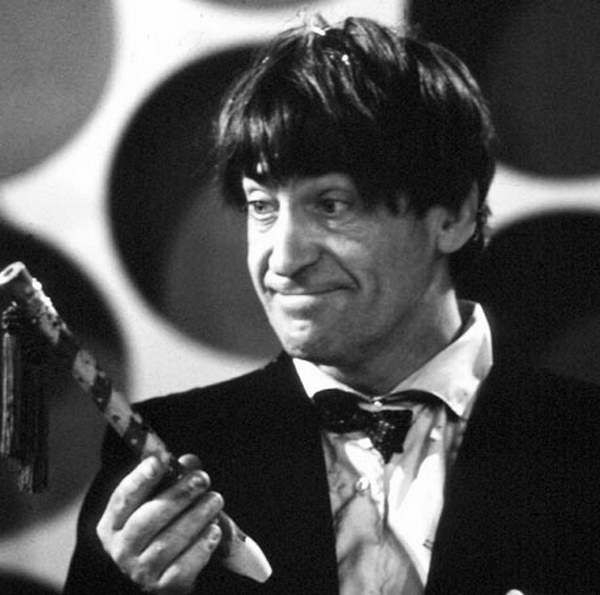
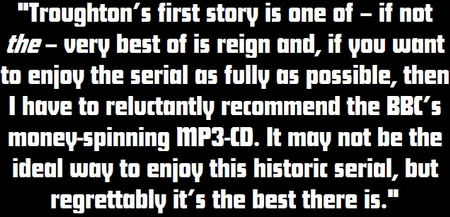 The second Doctor is the same man as the first (hence the lower case
‘second’ – it’s a common adjective, not a proper noun), but both his body
and his personality have been through a radical change. David Whitaker
cleverly leaves clues (such as the first Doctor’s brief reflection in the
mirror) to suggest to the audience that this man is the Doctor, but the
Time Lord’s companions – especially Ben – remain unconvinced; something
that shouldn’t be all that surprising considering that this new Doctor
often tends to communicate through his recorder by playing notes of
differing pitch instead of speaking, and that he seems to have quite a
penchant for his disguise – two things that his predecessor would never
have gone in for. Within the first ten minutes of the first episode, the
Doctor has stolen the identity of the murdered Earth examiner, and is back
to doing what the Doctor does best – meddling! Once the narrative has
kicked in, it doesn’t take long for the audience (and even Polly, to a
certain degree) to champion this chirpy, curiously amiable individual,
leaving only Ben to be convinced.
The second Doctor is the same man as the first (hence the lower case
‘second’ – it’s a common adjective, not a proper noun), but both his body
and his personality have been through a radical change. David Whitaker
cleverly leaves clues (such as the first Doctor’s brief reflection in the
mirror) to suggest to the audience that this man is the Doctor, but the
Time Lord’s companions – especially Ben – remain unconvinced; something
that shouldn’t be all that surprising considering that this new Doctor
often tends to communicate through his recorder by playing notes of
differing pitch instead of speaking, and that he seems to have quite a
penchant for his disguise – two things that his predecessor would never
have gone in for. Within the first ten minutes of the first episode, the
Doctor has stolen the identity of the murdered Earth examiner, and is back
to doing what the Doctor does best – meddling! Once the narrative has
kicked in, it doesn’t take long for the audience (and even Polly, to a
certain degree) to champion this chirpy, curiously amiable individual,
leaving only Ben to be convinced.
